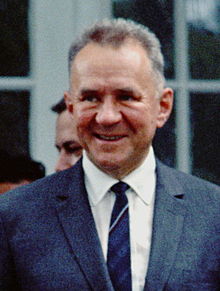
Back Aleksei Kosigin Afrikaans أليكسي كوسيغين Arabic اليكسى كوسيجين ARZ Alekséi Kosyguin AST Aleksey Kosıgin Azerbaijani Аляксей Мікалаевіч Касыгін Byelorussian Алексей Косигин Bulgarian আলেক্সেই কোসিগিন Bengali/Bangla Aleksei Kossiguin Catalan Alexej Kosygin Czech
Alexei Kosygin | |||||||||||||||||||||||||||||||||||||||
|---|---|---|---|---|---|---|---|---|---|---|---|---|---|---|---|---|---|---|---|---|---|---|---|---|---|---|---|---|---|---|---|---|---|---|---|---|---|---|---|
Алексей Косыгин | |||||||||||||||||||||||||||||||||||||||
 Kosygin in 1967 | |||||||||||||||||||||||||||||||||||||||
| 8th Premier of the Soviet Union | |||||||||||||||||||||||||||||||||||||||
| In office 15 October 1964 – 23 October 1980 | |||||||||||||||||||||||||||||||||||||||
| President | Anastas Mikoyan Nikolai Podgorny Leonid Brezhnev | ||||||||||||||||||||||||||||||||||||||
| Deputy | |||||||||||||||||||||||||||||||||||||||
| Leader | Leonid Brezhnev | ||||||||||||||||||||||||||||||||||||||
| Preceded by | Nikita Khrushchev | ||||||||||||||||||||||||||||||||||||||
| Succeeded by | Nikolai Tikhonov | ||||||||||||||||||||||||||||||||||||||
| First Deputy Premier of the Soviet Union | |||||||||||||||||||||||||||||||||||||||
| In office 4 May 1960 – 15 October 1964 | |||||||||||||||||||||||||||||||||||||||
| Premier | Nikita Khrushchev | ||||||||||||||||||||||||||||||||||||||
| Preceded by | Frol Kozlov | ||||||||||||||||||||||||||||||||||||||
| Succeeded by | Dmitriy Ustinov | ||||||||||||||||||||||||||||||||||||||
| |||||||||||||||||||||||||||||||||||||||
| Personal details | |||||||||||||||||||||||||||||||||||||||
| Born | 21 February [O.S. 8 February] 1904 Saint Petersburg, Russia | ||||||||||||||||||||||||||||||||||||||
| Died | 18 December 1980 (aged 76) Moscow, Russian SFSR, Soviet Union | ||||||||||||||||||||||||||||||||||||||
| Resting place | Kremlin Wall Necropolis, Moscow | ||||||||||||||||||||||||||||||||||||||
| Citizenship | Soviet | ||||||||||||||||||||||||||||||||||||||
| Political party | Communist Party of the Soviet Union (1927–1980) | ||||||||||||||||||||||||||||||||||||||
| Spouse | Klavdia Andreyevna (died 1967) | ||||||||||||||||||||||||||||||||||||||
| Residence | House on the Embankment | ||||||||||||||||||||||||||||||||||||||
| Profession | Teacher, civil servant[1] | ||||||||||||||||||||||||||||||||||||||
| Awards | |||||||||||||||||||||||||||||||||||||||
| Military service | |||||||||||||||||||||||||||||||||||||||
| Allegiance | Russian SFSR | ||||||||||||||||||||||||||||||||||||||
| Branch/service | Red Army | ||||||||||||||||||||||||||||||||||||||
| Years of service | 1919–1921[2] | ||||||||||||||||||||||||||||||||||||||
| Rank | Conscript | ||||||||||||||||||||||||||||||||||||||
| Commands | Red Army | ||||||||||||||||||||||||||||||||||||||
| Battles/wars | Russian Civil War | ||||||||||||||||||||||||||||||||||||||
Alexei Nikolayevich Kosygin (Russian: Алексе́й Никола́евич Косы́гин, IPA: [ɐlʲɪkˈsʲej nʲɪkɐˈla(j)ɪvʲɪtɕ kɐˈsɨɡʲɪn]; 21 February [O.S. 8 February] 1904 – 18 December 1980)[3] was a Soviet statesman during the Cold War. He served as the Premier of the Soviet Union from 1964 to 1980 and was one of the most influential Soviet policymakers in the mid-1960s along with General Secretary Leonid Brezhnev.
Kosygin was born in the city of Saint Petersburg in 1904 to a Russian working-class family. He was conscripted into the labour army during the Russian Civil War, and after the Red Army's demobilization in 1921, he worked in Siberia as an industrial manager. Kosygin returned to Leningrad in the early 1930s and worked his way up the Soviet hierarchy. During the Great Patriotic War (World War II), Kosygin was a member of the State Defence Committee and was tasked with moving Soviet industry out of territories soon to be overrun by the German Army. He served as Minister of Finance for a year before becoming Minister of Light Industry (later, Minister of Light Industry and Food). Stalin removed Kosygin from the Politburo one year before his own death in 1953, intentionally weakening Kosygin's position within the Soviet hierarchy.
Stalin died in 1953, and on 20 March 1959, Kosygin was appointed to the position of chairman of the State Planning Committee (Gosplan), a post he would hold for little more than a year. Kosygin next became First Deputy chairman of the Council of Ministers. When Nikita Khrushchev was removed from power in 1964, Kosygin and Leonid Brezhnev succeeded him as Premier and First Secretary, respectively. Thereafter, as a member of the collective leadership, Kosygin formed an unofficial Triumvirate (also known by its Russian name Troika) alongside Brezhnev and Nikolai Podgorny, the Chairman of the Presidium of the Supreme Soviet, that governed the Soviet Union in Khrushchev's place.
During the initial years following Khrushchev's ouster, Kosygin initially emerged as the leading figure in Soviet politics.[4][5][6] In addition to managing the Soviet Union's economy, he assumed a preeminent role in its foreign policy by leading arms control talks with the US and overseeing relations with other communist countries. However, the onset of the Prague Spring in 1968 sparked a severe backlash against his policies, enabling Brezhnev to eclipse him as the dominant force in the Politburo. While he and Brezhnev disliked one another, he remained in office until being forced to retire on 23 October 1980, due to bad health. He died two months later on 18 December 1980.
- ^ Law 1975, p. 214.
- ^ Cite error: The named reference
saddeathwas invoked but never defined (see the help page). - ^ Tucker, Spencer C.; Roberts, Priscilla (2008). "Kosygin, Alexei". The Encyclopedia of the Arab-Israeli Conflict: A Political, Social, and Military History [4 volumes]: A Political, Social, and Military History. ABC-CLIO. ISBN 978-1851098422.
- ^ Zubok, Vladislav M. (2009) [2007]. A Failed Empire: The Soviet Union in the Cold War from Stalin to Gorbachev. Chapel Hill, NC: University of North Carolina Press. p. 194. ISBN 978-0-8078-5958-2.
- ^ Brown 2009, p. 403.
- ^ McCauley, Martin (1993). The Soviet Union 1917-1991. Longman. p. 288. ISBN 0582-01323-2.
© MMXXIII Rich X Search. We shall prevail. All rights reserved. Rich X Search